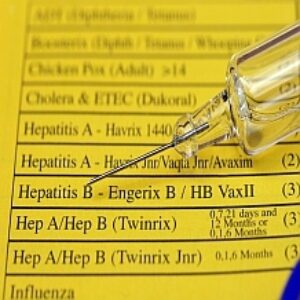What is Hepatitis B?
“Hepatitis” means inflammation of the liver. Toxins, certain drugs, some diseases, heavy alcohol use, and bacterial and viral infections can all cause hepatitis.
Hepatitis B is a contagious liver disease that ranges in severity from a mild illness lasting a few weeks, to a serious lifelong illness.
- Acute Hepatitis B virus infection is a short-term illness that occurs within the first 6 months after someone is exposed to the Hepatitis B virus. Acute infection can — but does not always — lead to chronic infection.
- Chronic Hepatitis B virus infection is a long-term illness that occurs when the Hepatitis B virus remains in a person’s body.
How is Hepatitis B spread?
Hepatitis B virus (HBV) is spread when blood, semen, or other body fluids infected with the HBV enter the body through a break in the skin, through mucous membranes (e.g., eyes, sores in the mouth), or through sexual intercourse.
People can become infected with the virus during activities such as:
- Birth (spread from an infected mother to her baby during birth)
- Sex with an infected partner
- Sharing needles, syringes, or other drug-injection equipment
- Sharing items such as razors or toothbrushes with an infected person
- Direct contact with the blood or open sores of an infected person
- Exposure to blood from needlesticks or other sharp instruments
Hepatitis B is not spread by:
- Sharing eating utensils
- Breastfeeding
- Coughing or sneezing
- Hugging, kissing, holding hands, or other casual contact
- Hepatitis B virus is not found in urine or feces
What are the symptoms of Hepatitis B?
Acute Hepatitis B symptoms:
Most adults (70%) will develop symptoms from acute HBV infection, but many young children do not.
Symptoms, if they appear, can include:
- Fever
- Fatigue
- Loss of appetite
- Nausea
- Vomiting
- Abdominal pain
- Dark urine
- Clay-colored bowel movements
- Joint pain
- Jaundice (yellow color in the skin or the eyes)
Symptoms usually last a few weeks, but some people can be
ill for as long as 6 months.
Chronic Hepatitis B symptoms:
Some people with chronic Hepatitis B have ongoing symptoms similar to acute Hepatitis B, but most individuals remain symptom free for as long as 20 or 30 years.
About 15–25% of people with chronic Hepatitis B develop serious liver conditions, such as cirrhosis (scarring of the liver) or liver cancer. Even as the liver becomes diseased, some people still do not have symptoms, although certain blood tests for liver function may show some abnormalities.
How soon after an infection do the symptoms appear?
On average, symptoms appear 90 days (three months) after exposure, but they can appear any time between six weeks and six months after exposure.
Does the infection of Hepatitis B make a person immune?
Infection with Hepatitis B can lead to immunity – if you recover from acute infection and the infection does not progress to chronic infection.
The younger a person is when infected with Hepatitis B virus, the greater their chance of developing chronic Hepatitis B. Worldwide, most people with chronic Hepatitis B were infected at birth or during early childhood.
Once you recover from Hepatitis B, you must get tested by your provider to see if you have developed immunity. Being free from symptoms does not mean that your immune system fought off the infection.
What are the complications associated with chronic Hepatitis B?
Chronic Hepatitis B is a serious disease that can result in longterm health problems, including liver damage, liver failure, liver cancer, or even death. Approximately 2,000–4,000 people die every year from Hepatitis B-related liver disease in the United States.
Is there a vaccine for Hepatitis B?
Yes. The Hepatitis B vaccine is a series of shots that stimulate a person’s natural immune system to protect against HBV.
Hepatitis B vaccination is recommended for:
- All infants, starting with the first dose at birth
- All children and adolescents younger than 19 years of age who have not been vaccinated
- People whose sex partners have Hepatitis B
- Sexually active persons who are not in a long-term, mutually monogamous relationship
- Persons seeking evaluation or treatment for a sexually transmitted disease
- Men who have sex with other men
- People who share needles, syringes, or other druginjection equipment
- People who have close household contact with someone infected with Hepatitis B
- Healthcare and public safety workers at risk for exposure to blood or blood-contaminated body fluids on the job
- People with end-stage renal disease, including predialysis, hemodialysis, peritoneal dialysis, and home dialysis patients
- Residents and staff of facilities for developmentally disabled persons
- Travelers to regions with moderate or high rates of Hepatitis B
- People with chronic liver disease
- People with HIV infection
- Anyone who wishes to be protected from Hepatitis B virus infection
What can be done to prevent the spread of Hepatitis B?
If you are concerned that you might have been exposed to the HBV, call your health care provider or the Spokane Regional Health District. If a person who has been exposed to HBV gets the Hepatitis B vaccine and/or a shot called “HBIG” (Hepatitis B immune globulin) within 24 hours, Hepatitis B infection may be prevented.
The best way to prevent Hepatitis B is by getting the Hepatitis B vaccine. The vaccine is safe and effective and is usually given as three shots over a six-month period.
Is there treatment for Hepatitis B?
Yes. While there is no medication available to treat acute HBV infection, treatment during an acute infection generally manages any symptoms and may require hospitalization. Antiviral drugs are available for the treatment of chronic Hepatitis B, but often these medications do not cure a person, but rather help to slow progression towards more serious liver disease such as cirrhosis.

Communicable Disease Investigation & Prevention (CDIP)
Epidemiologists monitor, track, and respond to infectious disease in the community to prevent spread of illness.

Hepatitis B for Healthcare Providers
Disease-specific information for healthcare professionals including reporting forms, fact sheets and contact information.
